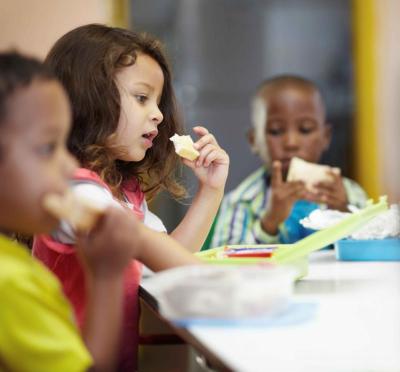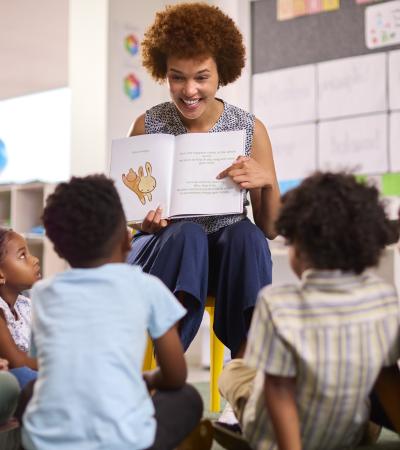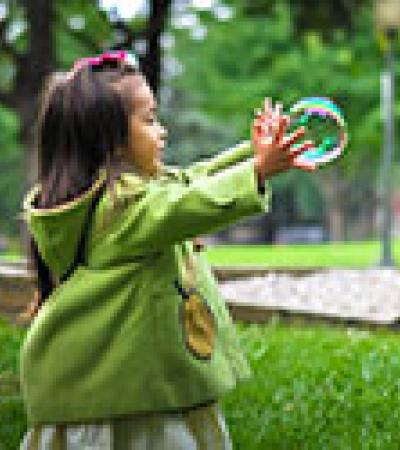In September, I had the opportunity to attend both the annual Association for Rural & Small Libraries (ARSL) and the biennial Association for Library Service to Children (ALSC) conferences. For me, the major take-away from both events is that libraries can help each other develop programs that address food insecurity.
Past blog posts in this series on health programming through community partnerships have focused on the health department, hospitals, and parks and recreation. This month I’m going to shift gears and look at how libraries can partner with other libraries to develop and implement high-impact programming focused on addressing food insecurity.

Filling children's heads, bellies and hearts
At the ALSC conference I attended a session on how to “Feed the Whole Child: Un-limiting Approaches to Filling Children’s Heads, Bellies and Hearts” presented by Kate McCartney, head of youth services at Marysville (Ohio) Public Library, and Shane Hoffman, technology services manager at Plain City (Ohio) Public Library.
Kate and Shane shared how “a group of like-minded individuals in the Ohio library world committed to eradicating hunger through advocacy, outreach and social networking” recently got together to develop Team Vittles. The Team Vittles model was inspired by California’s Lunch at the Library model.
Team Vittles prepares Ohio public librarians to participate in the USDA Summer Feeding program. Based on a peer-to-peer model, Ohio librarians in Team Vittles partner with other Ohio librarians to help them offer free summer meals and other programs to combat food insecurity across the state.
Kate is a champion of this program, and in 2017 her library was featured in a New York Times article, “Free Lunch at the Library.” Through Team Vittles, she and others in Ohio work to spread this program model throughout the state.
The session included ample time for discussion about how to develop programming around free summer meals at the library. Librarians in attendence shared what they have done. A librarian from Indiana who has offered free summer meals for the last eight years said that they do a lot of outside games and Lego programs to keep kids engaged after lunch. One librarian said they do volunteer-led storytimes, since the volume of participants makes it difficult to have them all participate in a single storytime, while another partners with the Girl Scouts to provide fun, engaging programs after lunch.
For more information on how to get started with summer meals at your library, check out the Team Vittles and Lunch at the Library websites. If your library has had success in this area consider forming a librarian-to-librarian support network in your region, like they have in Ohio and California.
Stimulating summers
There was also a session on summer lunch at the library at ARSL. There, Carolyn Peterson, rural library consultant for the Washington State Library, presented on how to create “Stimulating Summers, Engaging Young Minds” through library programs.
The state library has partnered with two rural libraries in Lincoln County and one in Adams County to help them develop programs that would simultaneously meet three community needs: the summer slump, summer hunger and summer enrichment activities. Peterson said that these communities, like many rural and small communities, lack daycare and summer recreation facilities, so the libraries have stepped into this void, offering structured day camps for six weeks from 8 a.m. to 5 p.m.
As you could imagine, a program of this magnitude requires extensive community partners. The libraries participate in the USDA Summer Meal programs to feed the kids lunch and snacks. Other partners included the county governments, School’s Out Washington, Innovia and the U.S. Institute of Museum and Library Services.
The library day camps also highlight the importance of staying active during the summer, with walks and afternoon physical activities being part of the program. In total, according to Peterson, the programs engaged nearly 50 percent of the kids in these rural communities.
Further reading
If you’d like to bring this to your library, now is the time to start planning for summer 2019! California’s Lunch at the Library website maintains a great list of resources on this topic. I particularly recommend this article on programs at Bristol (Conn.) Public Library and this video on Library District #2 of Linn County in Kansas.
These two resources emphasize the importance of offering engaging programming in addition to serving meals. Both libraries offer programs that engage the minds and bodies of the youth that participate in their lunch at the library programs.
Finally, OCLC/WebJunction has been working on this topic for some time. Check out their website for additional resources.



